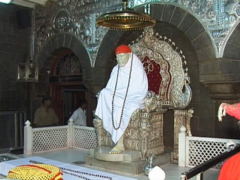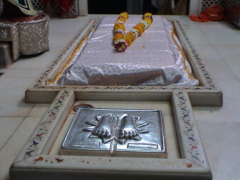By: Prathibha G
Reference Source: Shri Sai Baba Charters and Sayings by Shri Narasimha Swamiji
The sayings of a great Master are self-confirming and need no explanation or external validation. The intimate charters of the great Master are handed down to us as a priceless heritage of spiritual wisdom, due to perseverance, treasured and preserved work of the deeply loyal and truly devoted.
 Sai Baba had no preachers or agents, no printed materials or lavishly published marketing or advertising materials. He did not give any sermons, nor did he write any spiritual thesis. Those who came to Him came on their own accord for their own reason prompted them to do so. Baba never supported any pomp and show, any ritual, restriction of caste, creed, community or religion, and there was no compulsion of any kind. There was no distinction between man and woman, caste or religion, age, gender or wealth. Baba believed in brotherhood of man and taught this brotherhood all his life, and it had an authentic basis. He transmitted knowledge and teachings through the spoken word like in a ‘Gurukul’ that had a long historical and historical-standing in India. Baba preferred a very individual, one-on-one transfer of knowledge, grace, and instruction to his unending number of devotees. Almost everyone that were graced by Baba’s darshan had some form of knowledge transferred to them.
Sai Baba had no preachers or agents, no printed materials or lavishly published marketing or advertising materials. He did not give any sermons, nor did he write any spiritual thesis. Those who came to Him came on their own accord for their own reason prompted them to do so. Baba never supported any pomp and show, any ritual, restriction of caste, creed, community or religion, and there was no compulsion of any kind. There was no distinction between man and woman, caste or religion, age, gender or wealth. Baba believed in brotherhood of man and taught this brotherhood all his life, and it had an authentic basis. He transmitted knowledge and teachings through the spoken word like in a ‘Gurukul’ that had a long historical and historical-standing in India. Baba preferred a very individual, one-on-one transfer of knowledge, grace, and instruction to his unending number of devotees. Almost everyone that were graced by Baba’s darshan had some form of knowledge transferred to them.
Shri Sai Baba’s conversation and sayings were not delivered with the purpose of dazzling a handful of intellectuals with technical discussions of philosophy; his aim was to rouse the moral insight of the average seeker. Often employing analogies and similes drawn from experiences that are common to all men and women, the Master was able to carry conviction and inspiration to those who came to him. Using simple stories and clothing great truths in simple parables like Jesus Christ, Baba was able to create a pyramid of perceptions in the listener.
“Even from the tomb the voice of Sai Cries”
Baba’s survival as Apantaratma
47. To Lakshman on 15-10-1918
Jog thinks I am dead. I am living. Come and perform morning Arati
48. (Give me) my 1¼ Rupee (Majya Savva Rupya)
49. My tomb will speak and move with those who make me their refuge.
50. I shall be active and vigorous from my tomb also.
51. I will be with you, the moment you think of me, at any place.
52. As soon as a devotee calls unto me with love, I will appear. I require no train to travel.
**********************************************************************************
II. 1916
329, In 1916 Vijayadasami Day (October) Baba was in a rage. He tore off all his clothes and threw them into the fire (Dhuni) before him and stood there stark naked. Baba with red eyes shouted: “Fellows, decide for yourselves now If I am Moslem or Hindu.” After two hours of this rage, Bagoji Scindhe, his leper companion tied a langoti to him and said: “Why all this? Today is the festival of Simolanagan”. Baba striking the ground with his baton: This is my Simolangan (my going beyond the boundary of life.)
People could not understand his meaning then, but it was on the Vijayadasami day of 1918 that Baba crossed the boundary of life.
In 1916 before Vijayadashami, Baba had been seriously unwell and the rumor got abroad that he was about to die. And the devotees conducted a naam saptah at Shirdi with mass feeding for the recovery of his health. thereafter he recovered; but when Nanasaheb Nimonkar came there, on his way to Pune”
Baba: “Nana, you stay here, bury me and then go”.
Baba would not allow Nana either to go back to Nimon or proceed on to Pune. Shama intervened on behalf of Nimonkar and asked Baba for leave for his going away.
Baba: “Shama, do you want to kill my people. Is Kaka (Nana Nimonkar) eating your father’s property?”.
Shama: “But his daughter-in-law is pregnant and requires help”.
Baba: (Addressing Nimonkar): “Hello Kaka, why are you anxious? God will help. Bury me and then go”.
His daughter-in-law had no help. Suddenly at 10 p.m. one night, she felt that pains were coming and was at once taken in a tonga to the Pune Municipal Maternity hospital and left on a bed. The nurse went away to some other room at 11 p.m. and in the nurse’s absence, she was delivered of a male child without any help. Baba said to Nana Nimonkar at that time at Shirdi: “There was a woman. She was taken to a place. There she was delivered safe of a male child.”
330. Baba had told Uddhavesa Bua some months back no to be “paying fortnightly visits” and bade him final farewell. In Dasara time, Baba was unwell, for a number of days, as also Tatya Patil. In the earlier part he went and begged food in the accustomed places supporting his body on some others. During the last two or three days, he was not able to go out.
On the 15 October 1918, i.e., Dasara day, after Arati was over:
Baba: “You Kaka (H S Dixit), Buty, etc., go for your meal”.

And then they left. After they left, Baba sat upon his bed, reclined on Bayaji’s lap and said, “I am going. Carry me to the Wada. All the Brahmins will be living near me.” and then breathed his last. Nana Nimonkar poured water into his mouth; but the water came out. It was about 3 p.m. The day was no doubt Vijaya Dasami, but Ekadasi had begun at that time.
In anticipation of his passing away, he gave gifts (dana) in the morning of that Dasami. He sat up and paid from his pocket first Rs.5/- and then Rs. 4/- to Lakshmi Bai Sindhe who was daily preparing and giving him food and daily receiving Rs. 4/- from him. A few days before Baba passed away, he sent Rs. 200 for feeding fakirs and the chanting of prayers with drum beating, at a holy place. He sent word to another Moslem saint in these terms, “The light of Allah lit, he is taking away.” That saint received the intimation with tears.
Rama Vijaya had been read during the 14 days of Baba’s illness, i.e., on the 9th, 10th, 11th day of Dasara within Baba’s hearing, as he had said that “Mrityunjaya would be pleased thereby.”
On the night of Dasara, Baba appeared in the dream of Lakshman mama and said, “Get up quick and do my Kakada Arati. Jog thinks that I am dead, and he will not come.”
And Lakshman did the morning Arati in spite of the protest of the Maulvis. Jog resumed the noon arati on the 16th October 1918.
330. Baba’s reference to the approach of his Mahasamadhi: Baba to Chotakhan: “Put this garland on the fakir Banne Mea and tell him, Allah is taking away the lamp he placed here.” That was mentioned to the Moulana shortly before 15-10-1918. That fakir then shed tears.
IV. Baba’s Samadhi and Temple
331. One night both Shama and Bapu Saheb Buty dreamt that Baba wanted the latter to build a wada and a temple. H.S.Dixit. went to Baba to verify this with Shama.
Shama: “Deva what mysterious wonders you are working?”
Baba, (shutting his ears): “I am in my own place and say nothing to anyone”.
Then Baba was asked for permission to build and he gave it. Later Buty wanted to install Murlidhar’s image in the central hall without having a special garbhagriha Baba’s consent was asked.
Baba: “After the temple is built, we will reside there”.
When Baba was unwell and fast approaching his end, he said to Bayyaji and others. “I am going. Place me in the (Buty) Wada. Brahmins will reside near me”.
Buty did not wish to reside there or introduce Murlidhar after Baba passed away and he agreed to Baba’s remains being placed in the Wada. Then Hindus and Moslems had a hot contest as to where Baba’s mortal remains should be interred and the local Mamlatdar ordered a plebiscite to be taken through mahajars. The Hindus, by a large majority voted that Baba’s remains should be placed in Buty wada and that was done. Baba’s samadhi is now there.

Leave a Reply